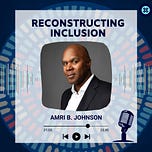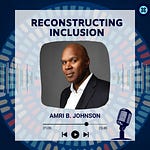Welcome to the Reconstructing Inclusion Podcast!
The conversation around race and racism has reached an inflection point. While traditional antiracist approaches focus on reforming racial categories and hierarchies, a growing movement of scholars is asking a more fundamental question: What if the concept of race itself is the problem we need to solve?
Dr. Sheena Mason, author of The Raceless Antiracist: Why Ending Race is the Future of Antiracism, represents this revolutionary thinking. In my recent conversation with her on the Reconstructing Inclusion Podcast, Sheena outlined a framework that challenges the very foundation of how we understand racial identity and racism.
As someone who has worked in diversity, equity, and inclusion for years, I'll be honest—Sheena's ideas initially challenged everything I thought I knew about antiracist work. But after reading her book and engaging in this deep conversation, I found myself questioning not just my language but my entire framework for understanding inclusion and justice.
The stakes couldn't be higher. As Sheena points out, despite centuries of reform efforts, "we still have not achieved the ideals of America" or any society where racialization exists. Her argument is both simple and profound: to end racism, we must end our belief in and practice of race itself.
The Fundamental Problem: Race as a Dehumanizing Apparatus
Sheena's central thesis challenges everything most people believe about race and identity. Rather than seeing race as a natural or biological category that needs to be celebrated or reformed, she argues it's fundamentally a "dehumanizing apparatus."
"The fiction of race is the dehumanizing apparatus that gets attached to human beings that then allows us to be broken into false hierarchies. And in that way, it's a thoroughly pernicious category and a thoroughly pernicious practice." [00:13:00]
Listening to Sheena articulate this foundational principle, I found myself grappling with the radical departure from traditional antiracist thinking. My immediate reaction—admitting I became uncomfortable using racial language after reading her book—illustrated how deeply her framework challenges our most basic assumptions. What struck me was how her approach creates immediate cognitive dissonance, forcing us to examine language we use without thinking. Rather than offering comfort through familiar categories, Sheena demands we confront the possibility that our tools for fighting racism might be perpetuating it.
Sheena draws a crucial distinction between race as a belief system and race as practice. It's not enough to simply change how we think about race—we must change how we practice it through our language, policies, and daily interactions. This dual understanding forms the foundation of what she calls the "Togetherness Wayfinder," her alternative framework for understanding human differences without resorting to racial categories.
Revolutionary Language: From "Black Person" to "Person Racialized as Black"
One of Sheena's most practical innovations is her approach to language. Instead of using terms like "a Black person" or "a white person," she advocates for phrases like "a person who gets racialized as Black" or "a person who gets racialized as white."
"In that shift, the idea is I'm centering the human. I'm recentering the human. A person, right? A human who gets racialized as... I'm highlighting the external factors that exists in a particular context or in a particular time that dictates that this person is fill in the blank race." [00:17:30]
My admission that I was "having a hard time saying the word race" and feeling "like I'm like in a choppy microphone" demonstrated the immediate impact of Sheena's linguistic framework. Far from mere semantic wordplay, her approach represents a fundamental reorientation of how we understand human identity. The discomfort I expressed reflected the cognitive shift required to move from essentialist thinking about race to understanding racialization as an external process imposed upon individuals.
This language shift accomplishes several critical goals: it recenters human dignity, highlights the external nature of racial categorization, and prevents the naturalization of race as an inherent characteristic. As Sheena notes, "race, modern scientists agree, is not a biological reality. It is not a biological fact about the human species."
Deconstructing the Data: Why Racialized Statistics Don't Help
Perhaps no aspect of Sheena's work is more controversial than her analysis of crime statistics and racialized data. In a section that challenges both conservative and progressive assumptions, she demonstrates how focusing on racial breakdowns of crime data actually perpetuates racist beliefs rather than combating them.
"When you break down the actual numbers, you come to recognize that, hmm, roughly 3% or less of all people get racialized as black in the United States are charged with committing a violent crime. And that includes like all violent crimes." [00:32:00]
Sheena's willingness to present data that contradicts popular narratives across the political spectrum revealed one of the most challenging aspects of her work. As someone with a scientific background, I appreciated the objectivity while acknowledging how controversial such perspectives can be. What became clear was how racialized data collection creates skewed perceptions that harm everyone, including those the data supposedly aims to help. Rather than advancing justice, focusing on racial breakdowns often reinforces the very stereotypes we claim to oppose.
Sheena's analysis extends beyond crime statistics to question the entire enterprise of racializing data. She argues that when we collect and present information through racial categories, we inadvertently reinforce the very hierarchies we claim to oppose. This creates what she calls "a skewed sense of justice"—where equality is measured by proportional representation in negative outcomes rather than the complete elimination of those outcomes.
Beyond Reform: Why Reconstruction Isn't Enough
Sheena's historical analysis reveals a pattern that challenges the foundation of traditional civil rights approaches. She argues that from Frederick Douglass to Black Lives Matter, antiracist movements have engaged in "reconstruction" rather than abolition—trying to write humanity into categories that were designed to deny it.
"The abolitionist project took the mantle of race and the language of it and tried to write humanity into it. I am a black man, says Frederick Douglass, and I am a man. Right. Like emphasis on man... That project of trying to reconstruct race to put humanity into it, is a failed project." [00:45:30]
Her historical reframing proved particularly powerful because it honored the courage and necessity of past civil rights struggles while acknowledging their inherent limitations. My engagement with this point reflected how Sheena's work doesn't dismiss previous antiracist efforts but rather argues they've reached their natural limits. What became evident was how centuries of reform have achieved significant progress—ending chattel slavery and Jim Crow—while falling short of full human liberation. Sheena's framework helps explain why assertions like "Black Lives Matter" remain necessary: the very categories being defended were created within contexts of dehumanization.
Sheena's analysis helps explain why assertions like "Black Lives Matter" are still necessary—because the very categories being defended were created within contexts of dehumanization. Her framework suggests that true liberation requires moving beyond these categories entirely, not just reforming them.
The Togetherness Wayfinder: A Framework for Raceless Futures
Sheena's alternative to race-based thinking is what she calls the "Togetherness Wayfinder"—a comprehensive framework for understanding human differences without resorting to racial categories. This approach translates what people mean when they use racial language into more accurate categories: culture, ethnicity, social class, economic class, and racism itself.
"If we imagine race is a villain in an episode of Scooby Doo? What happens at the end of every Scooby Do episode... The villain gets de-masked. So we imagine we're chasing race... we de-mask the villain, and then race shape shifts into these five different forms." [00:20:30]
Her playful yet profound analogy resonated because it made complex theory accessible and memorable. My enthusiastic response to this framework throughout our conversation showed how Sheena provides practical tools for everyday communication. The Scooby Doo metaphor brilliantly illustrated how "race" serves as a catch-all term that obscures more specific and accurate ways of understanding human differences. Rather than abandoning our understanding of diversity, the Togetherness Wayfinder approach allows people to maintain their cultural connections while abandoning the hierarchical aspects of racial thinking.
The Togetherness Wayfinder approach enables individuals to preserve their cultural connections and identities while rejecting the hierarchical and dehumanizing aspects of racial thinking. It's not about erasing differences but about understanding them more accurately and humanely.
A Vision of Raceless Futures
When asked to envision a world without race-based thinking, Sheena painted a picture of unlimited human potential. Her vision extends beyond the absence of racism to imagine what becomes possible when we stop constraining ourselves and others through racial categories.
"To my mind, racelessness is synonymous with limitlessness and there are two ways that limits get placed onto us. We internalize limits and then place limitations on ourselves. And then there's the external that happens in order for us to internalize the limitations... When I imagine a future without race slash ism, I imagine a future where there are no longer external limitations placed on any of us." [00:57:00]
Her closing vision proved particularly moving because it connected scholarly work to lived experience as parents. Both Sheena, as a mother of triplets, and I, raising a child in Switzerland, spoke about deliberately not moving our children into racial categories.
What struck me was how this conversation transcended academic theory to become deeply personal—about creating different possibilities for the next generation. Rather than ending with critique alone, Sheena offered a tangible vision of what liberation might look like, grounding her revolutionary ideas in hope for our children's futures.
Key Takeaways
Race is a practice, not just a belief: Ending racism requires changing both how we think about race and how we practice it through language, policies, and daily interactions.
Reform has reached its limits: Centuries of trying to reform racial categories have achieved significant progress but cannot deliver full human liberation because these categories were designed for dehumanization.
Language shapes reality: Shifting from "Black person" to "person racialized as Black" recenters human dignity and reveals the external nature of racial categorization.
Data can perpetuate what it claims to fight: Racializing statistics often reinforces harmful stereotypes and creates skewed understandings of justice and equality.
True antiracism requires race abolition: The most effective way to end racism is to end the belief in and practice of race itself, not just reform racial hierarchies.
The future is limitless: A world without race-based thinking opens up unlimited possibilities for human connection, creativity, and flourishing.
About the Guest:
Dr. Sheena Michele Mason is an influential scholar, educator, and advocate for antirace/ism. As an Assistant Professor of English at SUNY Oneonta, she has dedicated her career to dismantling racism through innovative approaches.
Sheena holds a Ph.D. in English with distinction from Howard University, specializing in African American, American, and Caribbean Literatures. She is the innovator of the "Togetherness Wayfinder" approach and has authored significant works including "The Raceless Antiracist: Why Ending Race is the Future of Antiracism" (2024) and "Theory of Racelessness: A Case for Philosophies of Antirace(ism)" (2022).
Her groundbreaking work has earned her multiple recognitions, including the SUNY Chancellor's Award for Excellence in Scholarship and Creative Activities (2025) and the inaugural Chancellor's Horizon Award for Faculty Research and Scholarship (2025).














